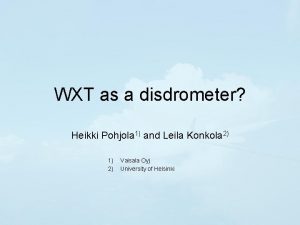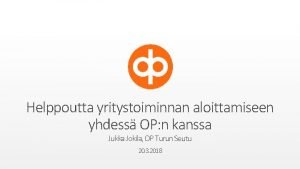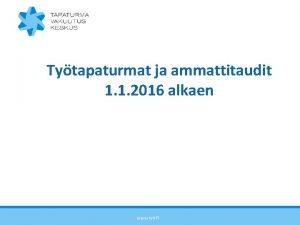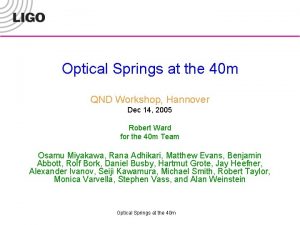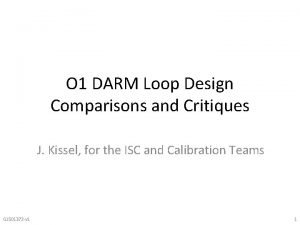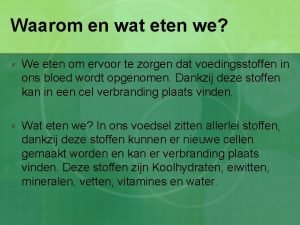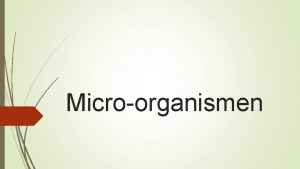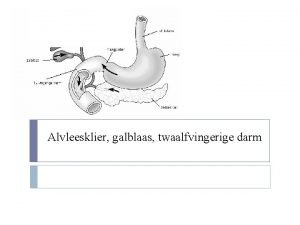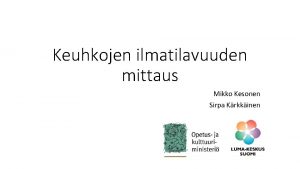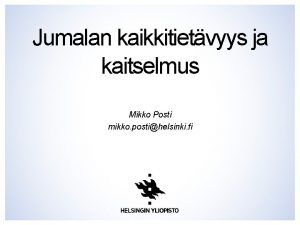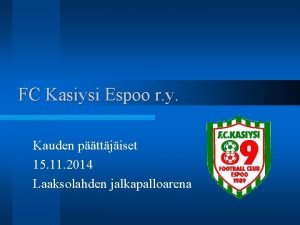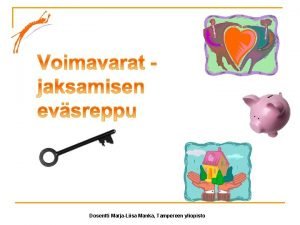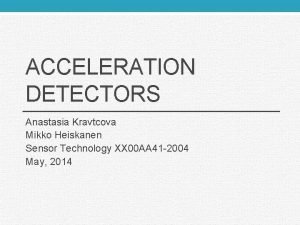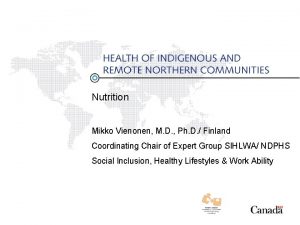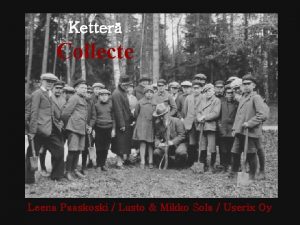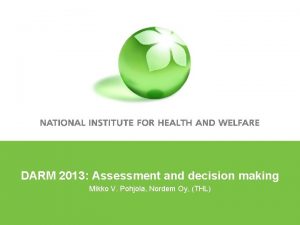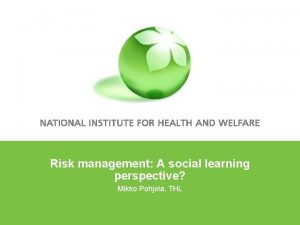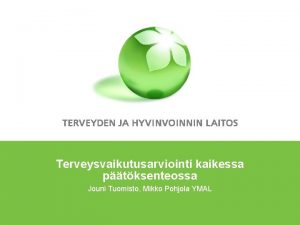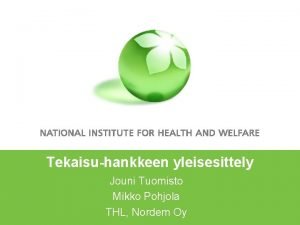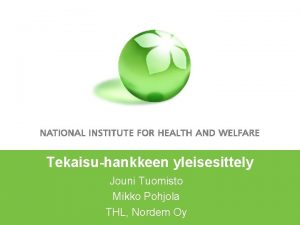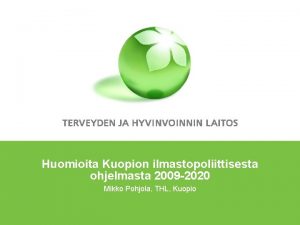DARM 2013 Puijo forest management Mikko V Pohjola





















- Slides: 21

DARM 2013: Puijo forest management Mikko V. Pohjola, Nordem Oy, (THL)

Contents • • • Practical issues? Reminders Tekaisu-project Puijo forest management planning Evaluation of the process Conclusions

Concepts • Assessment – knowledge support for practical needs • Policy – decisions and actions with societal relevance • Outcomes – changes in the world resulting from decision and actions • Practices – (common) ways of dealing with things • Effectiveness – capability (or likelihood) of achieving intended outcomes • Evaluation – analysis of the capability (or likelihood) of achieving intended outcomes

Framework for knowledge-based policy (Knowledge) practices Assessment • Process • Product • Use • Interaction Policy making Evaluation & management Implementation Outcomes • Design • Execution • Follow-up

Framework for knowledge-based policy • Focus on knowledge support to decision making – – – – Decision makers' needs? Societal needs? Other needs? Expert knowledge Local knowledge Opinions, views, perspectives, values → collaborative search for questions and answers • Evaluation and management of effectiveness -> proactive guidance of decisions and actions both now and in the future

Basic problem • Lankinen, et al. : State research institutes and research funding: proposal on a comprehensive reform: • “Preparation, decision-making and implementation of policy should be based on researched information and evidence. …the use of researchbased information in social policy decision-making, must be strengthened” • If we want policy to be ”knowledge-based” and ”effective”… …what constitutes effective knowledge-based policy? • and effective knowledge support to policy making?

Towards effective knowledge-based policy • TEKAISU-project 2012 – 2015 (? ) • development of knowledge-based policy practices (WP 1) • method and tool for evaluation and management of knowledge-based policy • development & testing of new policy practices in case studies (2013 ->) • Ranking of environmental health stressors and policy actions (WP 2) • Development of collaborative assessment methods, tools and practices (WP 3) • Focus on city-level decision making

(H)IA to all planning and decisions Why? • for whom? • what kind? • about what? Better knowledge-base of decisions • what decisions? • What aims? Better decisions • what actions? • by whom? Better actions Desired outcomes • what impacts? • where? • addressing whom?

E. g. suburban supermarket? Knowledge decisions: • framing • questions • societal needs • personal interests • other knowledge experts: • science/research • methods, tools business, citizens, NGOs: • personal interests • other knowledge Decisions Actions Impacts Zoning/planning Goods transport Air quality investment Personal transport Climate change Choice of market Building Transport mode Heating, electricity Environmental stress Location of services Consumption Location of residence Production … Work Leisure activity … Costs Profits Income Physical activity Quality of life … • How things are? • What changes if. . . ? • How should things be?

Puijo forest management • Puijo is a hill, natural reserve and recreational area in Kuopio • Development of forest management plan 2008 -2010 – Broad participation in planning and preparation of decision (-> common citizen views) • Still faced resistance and critique – now (finally) approved and in implementation • Use of knowledge in planning and decision making? – What happened, how and why did it turn out the way it did? – Testing of the evaluation methods – http: //fi. opasnet. org/fi/Puijo (in Finnish), http: //puijo. kuopio. fi/

Puijo forest management • Kuopio city forest management • Kuopio City council • Guidance group (City of Kuopio departments + METLA) • Consultants and forest management experts • 20 stakeholder groups • Survey participants (1300 + 400 respondents) • Demonstration participants and other upset citizens of Kuopio

Evaluation of the process • Five ”knowledge-based” approaches to effectiveness: • Dimensions of openness (Pohjola and Tuomisto 2011) • Knowledge-policy interaction (Pohjola manuscript) • Properties of good assessment (Sandström et al. manuscript, http: //en. opasnet. org/w/Properties_of_good_assessment) • Assessment effectiveness (Kauppinen et al. 2006) • Relational evaluation approach (Koivisto and Pohjola 2011) • Some overlap

Evaluation of the process • Dimensions of openness – – – Scope of participation Access to information Timing of openness Scope of contribution Impact of contribution

Evaluation of the process • Knowledge-policy interaction – – – Impacts Causes Problem owner Target Interaction

Evaluation • Properties of good assessment – – – Quality of content • Informativeness • Calibration • Coherence Applicability • Relevance • Availability • Usability • Acceptability Efficiency • Intra-assessment efficiency • Inter-assessment efficiencý

Evaluation of the process • Assessment effectiveness – Achievement of (general and stakeholder) goals – Influence of assessment to decision preparation and decision – Learning and changes in views

Evaluation of the process • Relative evaluation approach – – – Identification of needs and goals Identification of perspectives Evaluation of plan Evaluation of implementation Evaluation of outcomes

Evaluation of the process • Process was ”very participatory” and included knowledge from various sources • The decision followed the recommendation of the participatory assessment • However, also many limitations for different participants to influence the assessment and thereby the decision • Although much information is openly available, it is somewhat questionable what (and whose) knowledge and views the decision ultimately represents • Implementation faced resistance probably particularly because of the justifiable feeling of people not having real possibilities to influence (within the organized planning and decision process)

Conclusions • Just one case, but already this indicates that even ”good” policy processes can fall far short of ideal • Fundamentally decision making, assessment and participation often remain separate and do not fully converge • => development of policy practices towards better use of knowledge • => development of assessment methods and tools to serve the needs of the (new) policy practices • => the evaluation approaches were powerful in chracterizing decision/preparation processes

References • Pohjola, M. V. , Tuomisto, J. T. , 2011. Openness in participation, assessment, and policy making upon issues of environment and environmental health: a review of literature and recent project results. Environmental Health 10: 58. http: //dx. doi. org/10. 1186/1476 -069 X -10 -58 • Sandström, V. Tuomisto, J. T. , Majaniemi, S. , Rintala, T. , Pohjola, M. V. Evaluating effectiveness of open assessments on alternative biofuel sources. Submitted manuscript. • Pohjola M. V. Assessment of impacts to health, safety, and environment in the context of materials processing and related public policy. To be published in Comprehensive Materials Processing, Volume 8. Health, Safety and Environmental issues. Manuscript. • Kauppinen, T. , Nelimarkka, K. , Perttilä, K. , 2006. The effectiveness of human impact assessment in the Finnish Health Cities Network. Public Health 120, 1033 -1041. • Lankinen, T. , Hagström-Nasi, C. , Korkman, S. , 2012. Valtion tutkimuslaitokset ja tutkimusrahoitus: esitys kokonaisuudistukseksi. Valtioneuvoston kanslian julkaisusarja 3/2012. • Koivisto, J. , Pohjola, P. , 2012. Practices, modifications and generativity - REA: a practical tool for managing the innovation processes of practices. Systems, Signs & Actions 5(1), 100 -116. http: //www. sysiac. org/uploads/Sy. Si. Ac 2011 -Koivisto-Pohjola. pdf

Thank you!
 Heikki pohjola
Heikki pohjola Op korvauspalvelu
Op korvauspalvelu Potilasvahinko haittaluokat
Potilasvahinko haittaluokat Spijsverteringsstelsel rat
Spijsverteringsstelsel rat Darm
Darm 1 darm
1 darm Darm system
Darm system Darm
Darm Instapschoenen
Instapschoenen Oppervlaktevergroting dunne darm
Oppervlaktevergroting dunne darm Chronische neusontsteking
Chronische neusontsteking Alvleesklier en galblaas
Alvleesklier en galblaas Hh embryo
Hh embryo Sirpa kesonen
Sirpa kesonen Mikko posti
Mikko posti Mikko häikiö
Mikko häikiö Joannaseppa
Joannaseppa Mikko juusela
Mikko juusela Mikko manka tampereen yliopisto
Mikko manka tampereen yliopisto Potentiometric accelerometer
Potentiometric accelerometer Mikko vienonen
Mikko vienonen Modulaarinen tuotekehitys
Modulaarinen tuotekehitys
